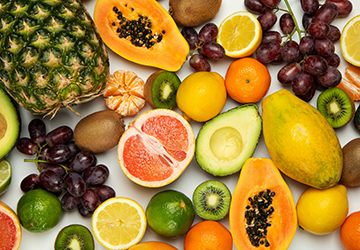Nutrition is critical when it comes to keeping your immune system healthy. Our bodies need essential vitamins and minerals to function properly, which weakens our immune system and makes us vulnerable to infection and disease. That's where superfoods come in—foods that are especially high in nutrients that can help boost our immunity. In the following article, we'll take a look at ten superfoods that can effectively boost your immune system and keep you healthy.
Superfoods: An Overview
Superfoods are nutrient-dense foods with significant health benefits. These foods contain many essential nutrients such as vitamins, minerals, antioxidants, and more, all of which contribute to a stronger immune system and overall health.
10 Superfoods for Strengthening Your Immune System
1. Papaya
i. Advantages for overall health
Papaya is a tropical fruit rich in vitamin C, vitamin A, potassium and antioxidants. It promotes good digestion, reduces inflammation, and may protect against heart disease and cancer.
ii. Immune system bolstering effects.
The rich vitamin C in papaya boosts the production of white blood cells, which protect the body from disease and infection. Regular consumption of papaya helps maintain optimal vitamin C levels and ensures a strong immune system.

2. Sweet Potatoes
i. Advantages for overall health
Sweet potatoes are rich in essential nutrients like vitamins A, C, manganese, antioxidants, and fiber. They can help maintain healthy skin, support good vision and aid in digestion.
ii. Immune system bolstering effects.
Vitamin A in sweet potatoes plays an important role in maintaining the integrity of the immune system. It aids in the production of white blood cells and supports the function of the mucosal barrier that protects against infection.
3. Kale
i. Advantages for overall health
Kale is a leafy green vegetable rich in important nutrients like vitamins A, C and K, as well as calcium, iron and antioxidants. It supports bone and heart health and promotes digestive health.
ii. Immune system bolstering effects.
Kale is rich in antioxidants that counteract the adverse effects of free radicals, which can damage cells and weaken the body's immune system. Additionally, vitamins A and C in kale support the production of white blood cells, which contribute to a healthy immune system.
4. Avocado
i. Advantages for overall health
Avocados are high in beneficial monounsaturated fats, fiber, potassium, and vitamins E and K, which may help promote heart health, improve digestion, and support healthy skin.
ii. Immune system bolstering effects.
The healthy fats in avocados aid in the absorption of fat-soluble vitamins like vitamin A, which are essential for a healthy immune system. Vitamin E, an antioxidant found in avocados, also supports immune function by protecting cells from damage.
5. Chia Seeds
i. Advantages for overall health
An excellent source of protein, fiber, omega-3 fatty acids, and antioxidants, chia seeds can benefit the body in several ways. They can help maintain a healthy weight, support heart health and improve digestion.
ii. Immune system bolstering effects.
The omega-3 fatty acids found in chia seeds have anti-inflammatory properties that support a healthy immune system. The antioxidants in chia seeds also protect cells from damage and help boost the immune response.
6. Kiwi
i. Advantages for overall health
Kiwifruit is a nutrient-dense fruit that contains high amounts of vitamins C, K, E, potassium, and fiber. It supports heart health, improves digestion and promotes healthy skin.
ii. Immune system bolstering effects.
The high vitamin C content of kiwi plays a vital role in the immune system by stimulating the production of white blood cells. Regular consumption of kiwifruit helps maintain adequate vitamin C levels and ensures a healthy immune system.
7. Quinoa
i. Advantages for overall health
Did you know that quinoa is a great gluten-free whole grain? It's rich in essential minerals like magnesium, phosphorus, and manganese, and it's an excellent source of protein and fiber. It supports heart health, improves digestion, and helps maintain a healthy weight.
ii. Immune system bolstering effects.
As a nutritional source of zinc, quinoa may help maintain proper immune system function. Zinc supports the production and activity of white blood cells, which help protect the body from infection and disease.
8. Red Bell Peppers

i. Advantages for overall health
Red peppers contain high amounts of vitamins A and C, potassium, and antioxidants. They may support eye health, promote healthy skin and reduce the risk of chronic disease.
ii. Immune system bolstering effects.
Red peppers contain more vitamin C than oranges, an important nutrient for white blood cell production and maintaining a healthy immune system. Vitamin A in paprika also helps maintain the integrity of the immune system.
9. Salmon
i. Advantages for overall health
Salmon is an excellent source of omega-3 fatty acids, protein and vitamin D. It supports heart health, improves brain function and promotes healthy skin.
ii. Immune system bolstering effects.
The omega-3 fatty acids in salmon have anti-inflammatory properties and may help maintain a healthy immune system. Vitamin D, found in salmon, also plays a vital role in immune function by regulating the activity of immune cells.
10. Mushrooms
i. Advantages for overall health
Mushrooms are rich in essential nutrients like vitamin D, selenium, potassium, and antioxidants. They support a healthy immune system, promote heart health, and help maintain a healthy weight.
ii. Immune system bolstering effects.
Mushrooms contain beta-glucans that activate immune cells and improve immune system function. Vitamin D and selenium in mushrooms support immune system health by regulating white blood cell function and protecting cells from damage.
Conclusion
Incorporating these superfoods into your daily diet can improve overall health and boost your immune system. A properly functioning immune system protects your body from disease and maintains optimal health. Start adding these superfoods to your meals and experience the benefits they provide.
FAQs
1. Can I eat too many superfoods?
While superfoods are very nutritious, it's important to maintain a balanced diet and not just rely on these foods. A balanced diet that includes a variety of vegetables, fruits, whole grains, lean protein and healthy fats is essential to achieving and maintaining good health.
2. How often should I eat superfoods to boost my immune system?
Try incorporating a variety of superfoods into your daily meals. This ensures you get the essential nutrients to support your immune system and overall health.
3. Can I take supplements instead of eating superfoods?
While supplements have specific benefits, getting nutrients from whole foods is generally considered the most beneficial. Whole foods combine vitamins, minerals, fiber and other compounds that work together to support your health.
4. Are there any side effects from eating superfoods?
Most superfoods are harmless. However, if you have allergies or sensitivities to certain foods, please consult your physician or licensed nutritionist before adding.
5. Are superfoods for everyone?
Superfoods can benefit people of all ages, from children to the elderly. However, if you have specific dietary needs or health concerns, it is recommended that you consult a physician or licensed nutritionist.




